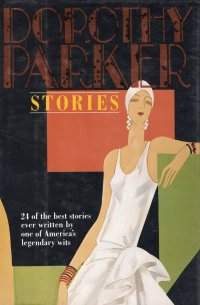 Wow, okay, I bought this book seven years ago. You know, I know that books languish on the shelves here at Nogglestead for decades, but sometimes it catches me by surprise. Perhaps I would have expected to pick it up before now. Especially since a while back, Facebook decided I liked Dorothy Parker and started showing me groups that posted quotes from her. That came and went, and likely once this post goes live, it will come again.
Wow, okay, I bought this book seven years ago. You know, I know that books languish on the shelves here at Nogglestead for decades, but sometimes it catches me by surprise. Perhaps I would have expected to pick it up before now. Especially since a while back, Facebook decided I liked Dorothy Parker and started showing me groups that posted quotes from her. That came and went, and likely once this post goes live, it will come again.
So: The intro, which I read because it was by Dorothy Parker, a bit she wrote for The New Yorker in 1927 called “The Short Story through a Couple of Ages” where she slags a bit on genre fiction and the kind of wholesome stories that one would have found in Grit or Good Housekeeping even into the waning days of the 20th century and a whole hecka lotta magazines and monthlys in 1927. Instead, she swore she would do something different. And…. Well, okay, she wrote a pile of “literary” stories featuring the doxies and their admirers in New York in the flapper era. And although she was lightly mocking them, they would come some seventy years later to be celebrated in Sex and the City and various other things which probably did not solely ruin women’s expectations in relationships, like Dorothy Parker probably did not herself ruin people’s reading of short stories for pleasure, but they’re part of the deluge that did.
So: Yeah, 21 stories. Slice of city life monologues, most about going out and partying and the results thereof, although a couple married couples living the stifling married life, which contrasts with…. the stifling doxy/party life, I guess. A couple, three, or more of the stories are monologues, whether an interior monologue or someone talking to another person for the whole story, sometimes a dozen pages, which does not ratchet up tension even as it reveals a story. But they’re certainly not like the genre or short stories for the plebes. They’re targeted to a certain class, dear (and not one who would say char instead), even as they satirize probably the same class.
It took me a while to read it at 386 pages–I thought I’d breeze through it because it was witty short stories, but I found myself reading a story or two a night and then reading video-game-based science fiction or watching movies for the remainder of the evening.
I did flag a couple of things:
- I did not flag the use of no truck with slang construction as I noted. This instance comes from, what, 1925? 1930? It appears periodically throughout the whole 20th century apparently, although I associated it with the mod squad era.
- I actually related to the story “The Little Hours” which is an interior monologue of an educated woman perhaps in the party scene anyway who awakens in the middle of the night, and it’s a stream of consciousness bit about how she thinks about French novels and whatnot as she tries to go back to sleep. Lately, I’ve been awakening and thinking about projects I’m on, projects I don’t have, where I’m getting firewood this winter, and other practical concerns. I thought I might reproduce a little of it here for you, gentle reader, but I’m not sure anyone gets anything out of the blockquotes. If you’re really interested, it looks like a PDF collection that includes the story is available at the Internet Archive. It looks to contain all the stories in this volume, actually.
- “The Little Hours” also contains, in a montage of poetical quotes near the end, I think I shall never see a poem as lovely as a tree. I just bought and read Vigils by Aline Kilmer, Joyce Kilmer’s widow, and when I bought the book, I told the shopkeeper whom Joyce Kilmer was and that that poem was quoted in two movies. Two old movies now I guess. If only I had read this volume before, I could have added a ninety-year-old short story to the list along with a thirty-year-old movie and a forty-year-old movie. To show the kids how “hep” I am.
- A short story has a character say that New York show business is run by Jew bastards. In 1930, this was probably the equivalent of using the baddest word to highlight that the speaker is a, erm, flawed person (if not outright bad). In the 21st century, this might very well mark the opposite in New York Society–whatever is left of it.
So with Dorothy Parker, you’re better off with the bon mots, I guess. Or maybe the poems. Which include one called “The Small Hours”, I learned whilst searching for “The Little Hours” on the Internet. I am sure I have run across her poems from time to time. Maybe I even have a volume of them around here. Or maybe I will someday. Maybe I’ll pick up a volume of her nonfiction. But Collected Stories Volume 2 (if it exists)? Well, probably that, too, because I am indiscriminate in my purchases, and seven years later I might read it.


